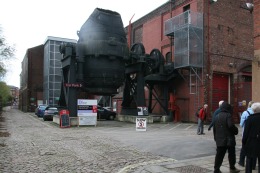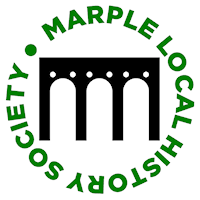 The first trip of MLHS’s 2010 season was an expedition to the delights of Sheffield on Thursday 21st October.
The first trip of MLHS’s 2010 season was an expedition to the delights of Sheffield on Thursday 21st October.
As is customary on these occasions, a coffee and comfort break was called after an hour or so and on this occasion it had been arranged at the Visitor Centre and factory of David Mellor Cutlery near Hathersage.
Here is Judith’s pre-visit info sheet.
Legend has it that Sheffield, like Rome, was built on seven hills. There were abundant reserves of ironstone and coal to the east. The gritstone edges to the west provided excellent grindstones, and the streams tumbling down the valleys between the seven hills gave unlimited water power. An iron extraction industry developed and the iron was used to make blades and knives of all kinds, and from this developed the world-beating cutlery industry. Today we are going to explore some of this, as well as seeing a little of modern Sheffield which is a really exciting place.
We start at the works of Master Cutler, David Mellor, located in an award-winning circular building on the footprint of the old Hathersage gas works. There will be a guided tour so you can see the cutlery being made, time for morning refreshments (included in the price), and an opportunity to visit the factory shop which sells the firm’s products and other high class kitchen ware.
We will then proceed to Sheffield where a lengthy lunch break is planned, giving time to look round. We will be in the town hall/ Peace Square/ Winter Gardens area. There is a good variety of places to eat, and interesting exhibitions in the adjacent Millennium Galleries. For a bit of fun, you could even ride the nearby Big Wheel and have a birds-eye view of the city! After lunch, we’ll stroll down the Gold Route, a wonderful pedestrian walk way with water features and pavement sculpture, leading to the city’s transport interchange. Here we will pick up the coach to make the short journey across town to Kelham Island Museum where we will spend the afternoon.
There are all kinds of good things here – a Bessemer converter, the River Don engine (in its time the most powerful steam rolling mill in Europe), exhibitions of the history of cutlery making and other Sheffield industries. There’s a café for that essential cup of tea before we have to make tracks for home. We will return via the Snake Pass, built as a turnpike road in 1818. Now, why is it called the Snake? Find out as we drive along.

